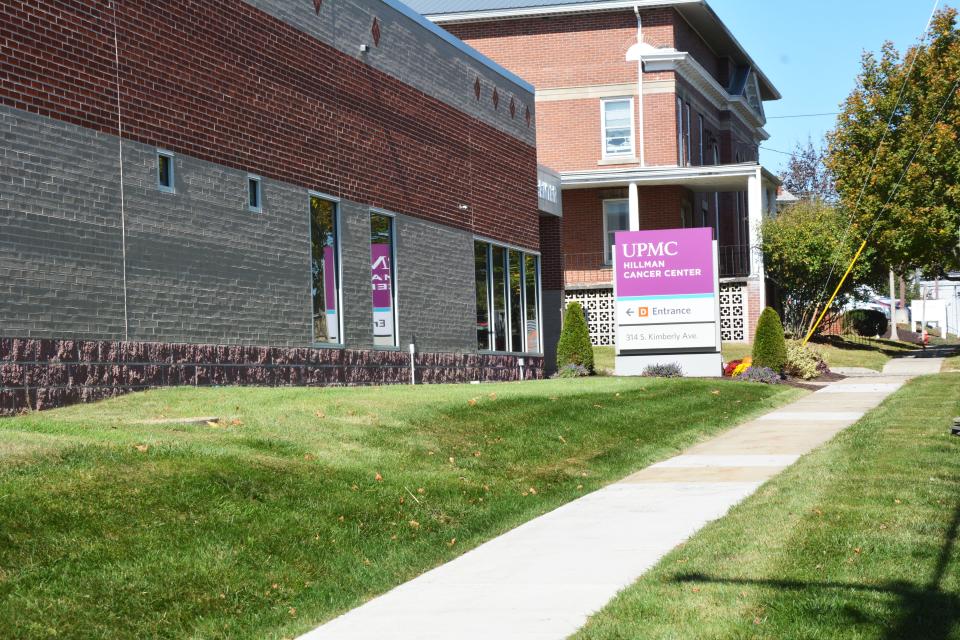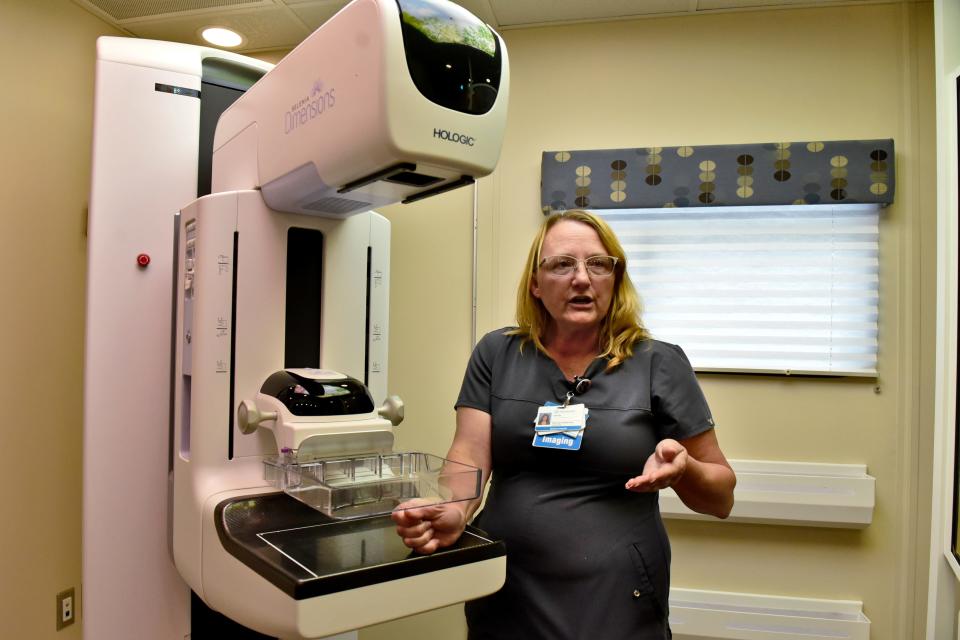Education, screening very important in fight against breast cancer
SOMERSET ― Education and knowledge is the key to detecting breast cancer early.
Dr. Aiman N. Daghestani, medical oncologist and hematologist at the UPMC Hillman Cancer Center at UPMC Somerset, said options for cancer treatment are always changing and understanding what treatment will work best for those who receive a breast cancer diagnosis is a very important step in treating cancer.
"In the old days, most patients came in at stage 3 and 4. Stage 1 was rare," he said. "Now with education, knowledge and technology, the ratio is completely reversed. Some stage 4 cases now are often women who decided to ignore the signs.
"When I started to practice, cancer was a scary topic. Some families didn't want the patient to know they had cancer."

Daghestani said post-COVID-19, there has been a decline in the number of women receiving their annual mammograms. He said that's one of the unfortunate side effects of COVID.
Before COVID, Daghestani rarely saw advanced stages of breast cancer. But because of COVID when offices closed down to prevent spreading the virus, women held off going for mammograms. There were surgical delays. The trend became more advanced stages of the disease were being seen, he said.
Mammography important tool in prevention and detection of breast cancer
The good news is "I think things are going back to where they were before," Daghestani said.
"Men can have breast cancer too," he pointed out. "They need to be alerted to the possibility and seek medical advice. Not to ignore it."

UPMC Somerset offers 3D mammography, which finds 20-65% more invasive breast cancers compared to 2D alone. It is superior technology for women with dense breasts and reduces callbacks for additional imaging. To schedule a mammogram, call 814-443-5096. The UPMC Hillman Cancer Center is at 314 S. Kimberly Ave., Somerset.
Symptoms of breast cancer can include:
a breast lump or thickening, often without pain
change in size, shape or appearance of the breast
dimpling, redness, pitting or other changes in the skin
change in nipple appearance or the skin surrounding the nipple (areola)
abnormal or bloody fluid from the nipple.
People with an abnormal breast lump should seek medical care, even if the lump does not hurt.
"Screening for cancer is very important," Daghestani said. "All cancer needs to be detected early. Knowledge is very important."
Breast cancer diagnosis, treatment
Breast cancer cells begin inside the milk ducts and/or the milk-producing lobules of the breast. Breast cancer occurs when abnormal cells grow out of control in one or both breasts. The cells can spread (invasion) within the breast, to nearby lymph nodes and other tissues, and to other parts of the body (metastasize). The earliest form (in situ) is not life-threatening.
Daghestani said the treatment advances are tremendous.
"In the old days everyone who came in got the same treatment," he said. "There is a huge difference in treatment and improvements in technology. If I see 10 patients in one day, the same cancer will not have the same treatment for all the patients. Every patient and every cancer has different characteristics."

Cancer itself as well as genetic changes in the cells can't be passed down from parents to children. However a genetic change that increases the risk of cancer can be inherited. He said the researchers analyze the differences between genetic cancer. He said the abnormality of the presence in each particular patient will tell them what is driving the cancer.
Treatment for breast cancer is based on the type and stage of the cancer and other aspects, such as the patient's overall health. The main treatment is surgery to remove the cancer. Other treatment options may include radiation therapy, chemotherapy, endocrine therapy, or targeted therapy.
"The treatment is personalized to the character of the cancer. Each patient is different. Each patient is treated differently," Daghestani said. "It's not helpful to compare yourself to other patients. Each treatment is different."
He said the research for each gene abnormality will give doctors the information they need to decide what kind of treatment to give the patient.
Target therapy is aimed at proteins that control how cancer cells grow, divide and spread. As researchers learn more about the DNA changes and proteins that drive cancer, they have a better chance of deciding on treatments that target these proteins. Target therapy is given through small-molecule pills or capsules to swallow.
Immunotherapy uses the immune system to fight cancer
"Immunotherapy is different. It has different side effects. It rarely causes nausea, vomiting, hair loss," Daghestani said.
Immunotherapy uses substances made by the body or in a laboratory to boost the immune system and help the body find and destroy cancer cells. It works by helping the immune system recognize and attack cancer cells.
Chemotherapy involves chemicals that can't distinguish between normal cells and cancer cells, Daghestani said.
"There is huge progress in the treatment of cancer these days with less chemo, more immunotherapy and target therapy," he said. "We receive new information every day. How they treated cancer in the past is completely changing. We talk about and decide what's best the treatment for each patient."
Somerset's oncology center
UPMC Hillman Cancer Center opened in Somerset in June 2022. This location offers medical oncology services, provided by Daghestani. The state-of-the-art facility features an enlarged treatment area with nine treatment spaces and four exam rooms, and onsite laboratory services. This location has treated a significant number of patients with breast cancer.
"We work as a team. We have a wonderful radiology center in Johnstown," Daghestani said.
Hospice care is also a very important aspect of cancer treatment, he said.
"The goal is to help the patient at every stage of the disease. We give them the information, the pros and the cons," Daghestani said. "Our job is to help them."
And if the patient decides against treatment, the decision is accepted.
"We respect the decision of the patient as long as we give them the information," Daghestani said. "Some will go by what others say. They feel good right now so they decide they don't want to do anything. But their health won't stay the same. Their condition deteriorates. We explain, but they decide.
"We try to keep them home as long as possible. Our job is to keep them comfortable," he said. "We use the pain clinic services. Hospice comforts the patient."
The stress of cancer is not only felt by the patient, but also the family.
"We count that as part of the side effects of cancer," Daghestani said.
Stress is caused by finality, the ups and downs of the treatment, and financially, he said.
"There is also a financial pressure on the family. Drugs are very expensive," Daghestani said. "We have a full-time employee whose job it is to see how they can help to cover the drugs. We provide patient care from every angle. Even if the patient decides to not get treatment, we can still be available to help them navigate all the aspects of treatment."
This article originally appeared on The Daily American: Screening, education, knowledge key in breast cancer fight

